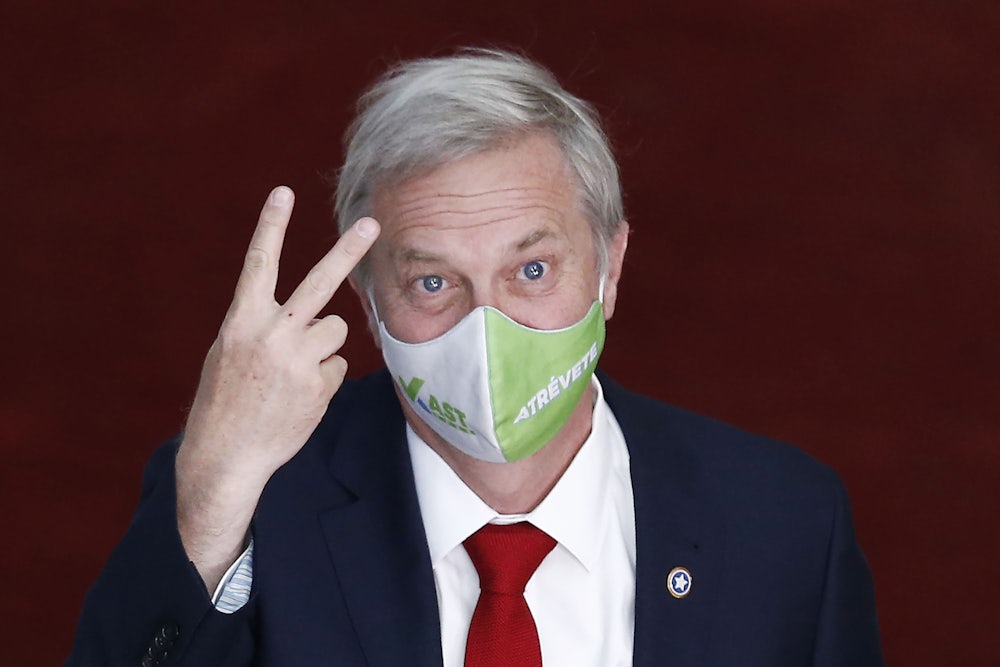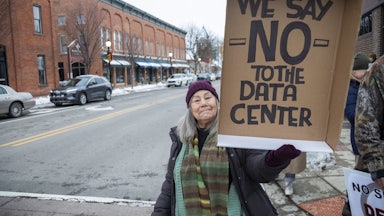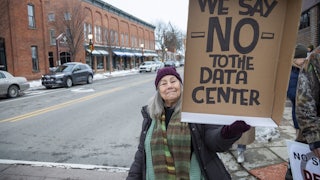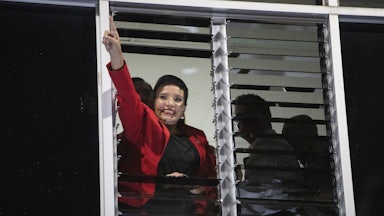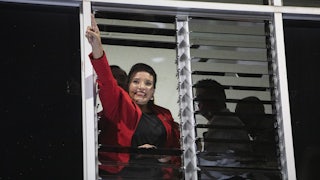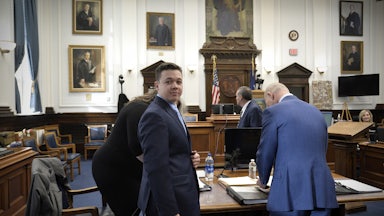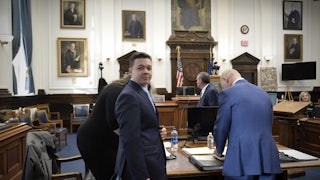Last month, Chileans headed to the polls for the first round of presidential elections. The candidate who got the most votes is a far-right leader named José Antonio Kast, who has taken inspiration on how to stoke a culture war from experts like Spain’s reactionary Vox Party, Brazilian President Jair Bolsonaro, and the Trump-pilled Republican Party. On December 19, Kast will face 35-year-old left-wing former student union leader Gabriel Boric, who has been leading in the polls. That election could decide the future of climate policy both in Chile and Latin America.
But this week Kast was in Washington, where he met with Republican Senator Marco Rubio and a representative from the Organization of American States; he also joined a gathering of U.S. executives over tapas near the headquarters of the World Bank before being scheduled for a meeting with Council of the Americas President Susan Segal on Wednesday.
Kast—who’s garnered the support of Chile’s establishment right—has extensive ties to dictatorships both abroad and in Chile, where meetings like those he’s taking in Washington recall an ugly and not-too-distant history. As Ryan Grim and Maria Hibbet pointed out for The Intercept, Kast’s father served as a lieutenant in the Nazi army before fleeing to Chile. Christian Kast, José Antonio’s older brother, was allegedly present during a series of mass killings in September 1973, on the side of Augusto Pinochet’s brutal military dictatorship as it consolidated power following the U.S.-backed coup against Salvador Allende, a democratically elected socialist. José Antonio’s German-born brother Miguel was one of many Chileans to attend the University of Chicago on a scholarship from the Ford Foundation as part of a program organized by the State Department. Like many “Chicago Boys,” Miguel served as a close adviser to Pinochet, whose regime rounded up, tortured, and killed thousands during its reign. After his time as Milton Friedman’s student in Hyde Park, Miguel Kast became the minister of planning and labor before taking over as head of the Central Bank of Chile.
While he’s cast himself as an outsider to politics, José Antonio Kast has long been a federal legislator and member of the establishment Independent Democratic Union, a party known by the Spanish acronym UDI. But in 2019, claiming UDI was too accommodating to the left, he split off to form Partido Republicano de Chile—the Republican Party of Chile. That name, says Hassan Akram, professor of public policy at Diego Portales University, was chosen with an eye toward the United States. “The American Republican Party has embraced the anti-science and culture-war tropes as opposed to just standard right-wing economics,” he told me. “That is something Kast is trying to import into Chilean politics now.”
Kast’s original platform—now being revised—stated that he would move to build new coal-fired power plants equipped with carbon capture and storage, “in the event that the dominant climate position is reliably validated, which until now has not been recognized, since it is based on simple recent correlations.” His adviser, Julio Vergera, who teaches courses on sustainable energy at the Pontifical Catholic University of Chile, has said that climate change “is more due to natural reasons than human influence.”
Boric, by contrast, has made climate one of his four core priorities in his run backed by the Apruebo Dignidad (Choose Dignity) electoral coalition. “This is the first time that the Chilean left wing actually decided to have a platform that prioritizes climate and environmental policies,” said Pedro Glatz Brahm, a spokesperson for Boric’s environmental policy team, who has also coordinated policy for Nuestra América Verde (Our Green America), a regional initiative to design a proposal for a Green New Deal in Latin America. Among the policies in Boric’s extensive, over-200-page policy program are to make sizable green investments as part of an economic recovery plan, create a publicly owned company to oversee mining the country’s vast reserves of lithium—a critical component of electric vehicle batteries—as well as enact pilot programs for “double zero” transportation: zero emissions and zero cost to riders.
The transportation policy has a particular resonance in Chile. In 2019, Sebastián Piñera’s proposed 30 peso hike in the cost of the Santiago Metro sparked a wave of protests that had been building within the “pressure cooker” of Chile’s intensely commodified and unequal economic model. As many as four million people are believed to have participated in the demonstrations, which laid the groundwork to rewrite the country’s Pinochet-era constitution.
While University of Chicago–trained economists like Kast’s brother served as key advisers, it was economist James Buchanan who acted as a key architect of the 1980 “constitution of liberty,” a document designed to insulate rules imposed by the dictatorship against democracy. As Nancy MacLean details in Democracy In Chains: The Deep History of the Radical Right’s Stealth Plan for America, Buchanan was a longtime ally of fossil fuel magnate Charles Koch, who considered Friedman and the University of Chicago set sellouts. Buchanan was a key adviser to Koch as he set up the Cato Institute, a libertarian think tank that long sponsored the research of so-called climate “skeptics” and named Buchanan a distinguished senior fellow. Thanks to its constitution, Buchanan’s influence in Chile is ongoing.
The “wicked genius of Buchanan’s approach to binding popular self-government,” MacLean writes, “was that he did it with detailed rules that made most people’s eyes glaze over. In the boring fine print, he understood, transformations can be achieved by increments that few will notice.” Legislative supermajorities, for instance, are required to make any substantive changes. A politically appointed “constitutional court” holds outsize power effectively to exercise veto power over any proposed changes. And the constitution further enshrines pay-as-you-go rules as part of balanced budget requirements.
It has also, unsurprisingly, been a key blocker of climate policy. Of particular concern are a number of coal-fired power plants set to be wound down, both for climate concerns and because coal—an import to Chile—is becoming an increasingly inefficient power source in the sun-drenched coastal country. The plants are now due to be mothballed, but the constitution is standing in the way. “The government has tried to negotiate with the energy companies, but the way the constitution works is that it would require them to pay huge compensation if they’re going to expropriate these assets,” Akram told me. “The Chilean Constitution, with its very high levels of property rights protection and rules about compensation, makes it much more expensive to decarbonize the energy system.”
“Once you get approval from the state to build any investment project in any industry, it’s really hard to regulate those things or to close them,” Glatz Brahm added. The constitution, he says, “doesn’t allow us to quantify a proper transition.” Implementing any Green New Deal–style policy, he noted, like Boric’s plan to have a public company build green social housing, would require the approval of impossibly large majorities in the National Congress.
On the heels of sustained protests, 78 percent of the country voted in October 2020 in favor of an assembly process that would rewrite the constitution. Many see that process—now being led by the left and center-left, after the right failed to gain the one-third of votes that would have allowed them to stymie it—as likely to be much more impactful than the presidency itself. It’s possible that the next president will only serve for a year depending on the governmental structure the assembly sets up. Kast is eager for that not to happen and, having campaigned against the assembly process, has vowed to lead a “reject” campaign against almost anything it decides, which will eventually go to a nationwide vote. He campaigned, after all, to keep Pinochet in office in 1989, and in recent weeks has said that “if Pinochet were alive, he would have voted for me.”
Like just about every other candidate who ran in the last round of elections, Boric promises to see the assembly process through to completion and respect its autonomy. Among the changes it could usher in—over fierce opposition from the right wing—would be officially designating Chile a pluri-national state like neighboring Bolivia, respecting the sovereignty of Indigenous populations who have been key protectors of biodiversity. The new constitution could further enshrine the Rights of Nature, setting the stage for ambitious carbon-cutting and conservation measures, and establish rights to water amid ever-worsening, climate-fueled droughts.
Kast’s strong showing can’t really be read as a backlash against fears that Chile is moving too far to the left, as some pundits have suggested. The results could just reflect that he was the only candidate who opposed a constitutional assembly. “Kast got the biggest minority, but votes in favor of the new constitution were divided among six other candidates,” Akram said. “If you look at the actual numbers, the reason that Kast came first is that you’re dividing the votes in favor of the new constitution.”
Though Kast has doubled down on a host of right-wing culture-war positions—denouncing the existence of a “gay lobby” and pledging to dismantle Chile’s Ministry of Women and Gender Equity, for instance—he’s distanced himself from his more fringe views on both Covid-19 and climate. Retrograde social issues have played a key role for the Chilean far right since the dictatorship, which banned abortion and rolled back progressive family planning policies enacted under the Allende government. Akram argues that an increasingly international far right is looking to use social media to galvanize voters around key culture issues, in large part as a distraction from broadly unpopular economic policies. At least so far, polarizing around climate hasn’t gotten much traction in Chile, leaving Kast to stick to more bread-and-butter, reactionary, and social mediagenic talking points like anti-communism, misogyny, criminalizing protests, and stoking fear of migrants. When challenged during a televised debate, Kast said he would—contra his platform at the time—be willing to ban coal-fired power plants. Kast’s environmental plank now states that climate change “is real, and the scientific evidence that demonstrates the human impact in this emergency is undeniable.”
Recent years have seen the resurgence of a violent, anti-democratic right in Latin America, including in Brazil and Bolivia, and the attempt by the Honduran right to falsely declare victory in elections held this week. But pushback has been just as fierce. Bolivian President Luis Arce managed to put the Movement for Socialism back in power there, and Honduran President-elect Xiomara Castro has ended the 12-year rule of the National Party, which rose to power on the back of a successful U.S.-backed effort in 2009 to oust her husband, former President Manuel Zelaya. It seems likely Luiz Inácio Lula da Silva will defeat Bolsonaro in Brazil next year. Odds are looking good that Boric will fend off Kast during the runoff later this month, too. But the anti-democratic politics that figures like him are unleashing—with eager support from prominent figures in the U.S.—won’t disappear so easily.
